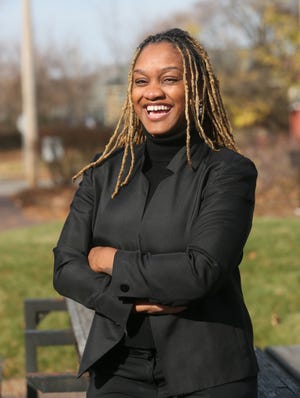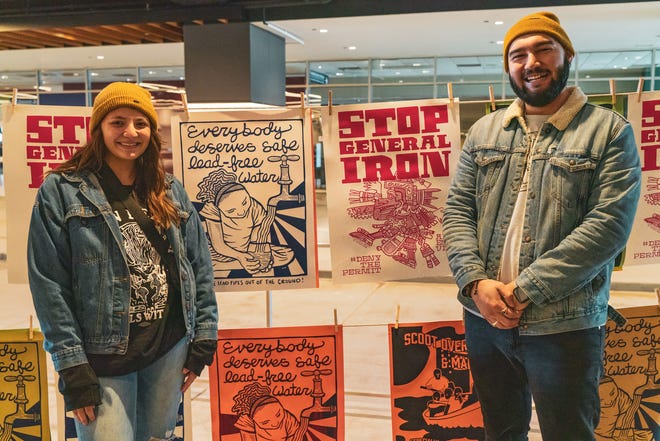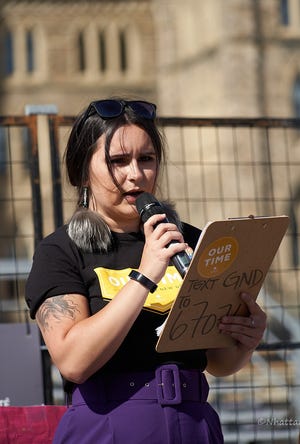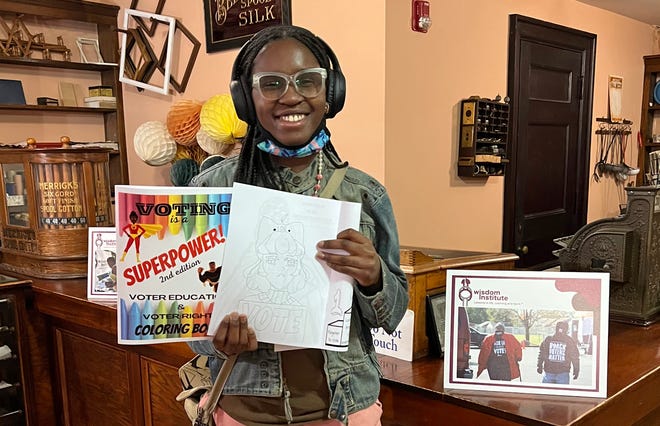Meet four young women involved in the movement to safeguard the Great Lakes
Dec 12, 2022 10:39AM ● By Content EditorBy Caitlin Looby - Milwaukee Journal Sentinel - December 8, 2022
A landmark international study last year found that more than half of young people ages 16-25 felt "sad, anxious, angry, powerless, helpless and guilty" about climate change. They said their concerns affected their daily life, and they blamed government for "feelings of betrayal."
Responding to a survey is one thing; taking action is another.
Millennials and Generation Z have become more likely to get involved in climate change and environmental activism, whether by volunteering and attending rallies or protests, according to a recent survey of United States youths.
Such activism is especially important in the Great Lakes region. After all, the lakes hold 20 percent of the world’s freshwater, while many historically-marginalized communities struggle for access to clean drinking water.
To see what some young people in the Great Lakes are doing, the Journal Sentinel talked to four young women who are emerging as leaders in their communities.
Dynasty Ceasar, a Milwaukee-native, is the senior campaign organizer with the Redress Movement that documents the effects of segregation in Milwaukee, Denver and Charlotte. Only 13 years old, Brooke Bowers is a youth leader for We the People of Detroit, an organization that educates and mobilizes citizens to improve their quality of life. In Chicago, Brenda Santoyo is a senior policy analyst at Little Village Environmental Justice Organization, which fights for water justice. Lindsey Bacigal is the communications coordinator at Healing Our Waters — Great Lakes Coalition in Michigan that works to protect and restore the lakes.
The four women spoke about how equity should be at the forefront of the climate movement, what inspires them and what changes they want to see in their communities. The interviews were edited for clarity and brevity.

Dynasty Ceasar: ‘Comfort cannot be at the forefront of our decisions’
What do you believe is one of the biggest environmental challenges in Milwaukee?
Ceasar: One main thing is how [climate change] affects housing. [Recently,] there was a hearing with We Energies and they were talking about increasing the rates and I'm thinking about how the effects of climate change on a house that was built 135 years ago and how that house wasn't built to sustain the effects of climate change today. And when I think about climate change, I think about how it affects communities of color primarily. And it's really the conversation around housing and how that creates an energy burden for our communities.
What motivates you to do this work?
Ceasar: I think about connectivity, and what it means to be connected to one another. We have so many things that divide us or things that we choose to focus on that divide us. But one thing that we cannot deny is that we all live on the same planet and we're responsible for it. Whether or not we want to acknowledge it, climate change is a human issue that’s affecting all of us, but some of us are being disproportionately affected by it.
How can we hold corporations accountable for their contributions to climate change?
Caesar: When we talk about climate change, and we're talking to the general public, the responsibility of fixing climate change has been focused on the individual. We've not been asking the corporations to step up enough. Yes, we do need to stop littering, but we need to talk about bigger factors that contribute to climate change. We have to go after the corporation instead.
It’s policies and regulations. How are we going to push lawmakers to address that? We can’t be limiting our reach to plastic and paper straws. That can't be all we're willing to do.
We're at a place where comfort cannot be at the forefront of our decisions. We cannot be comfortable right now. And we can't put it all on the individual. It's got to be on the lawmakers to say this is important.
What changes do you hope to see in Milwaukee in the coming years?
Caesar: I'd like to see (Milwaukee’s) Climate and Equity plan be implemented. I think the city is off to a great start in terms of identifying where issues are and then determining what the best processes to move forward.
I really hope that there's a policy that's implemented that encourages or forces landlords to now have to pay for heating and cooling or at least update the windows. Something has to be in place because the energy burden on communities is causing displacement. People have to choose between housing, paying their energy bill or food.

Brenda Santoyo: ‘I feel l like environmental work found me’
Tell how you got into the work you’re doing now?
Santoyo: I started getting more into the depths of public policy, social issues and inequalities when I was in college through the courses and the conversations I was having with my classmates and professors. It allowed me to deeply reflect on my own lived experiences. I was really able to recognize a lot of the inequities that I was learning about and working to address. It’s something that I am doing because I genuinely care for the communities I’m fighting for. I feel like environmental work found me.
Share a moment where you really felt like you made a difference.
Santoyo: One of the biggest ones was when we (were able to get) passed Illinois state legislation mandating the removal of all lead service lines within the state of Illinois. To be able to pass state legislation to call for the removal of all lead service lines is a really big deal. I think that really moved us in the right direction when it comes to fighting for clean and accessible lead-free water.
What do you do to have work-life boundaries and maintain your mental health?
Santoyo: I really just try to give myself time away from digital media, staying off my phone and laptop for at least a few hours a day. I do a lot of journaling and reflecting on my days, the highs and lows. But, I think it's really difficult. And I would say that I'm still working on finding a boundary between my work and personal life.
What are some things you’d like to see people do to help their communities?
Santoyo: Reach out to the community organizations that are doing cool stuff around you. Look at their websites. Look at their social media. Take a look at the work that they're doing and help uplift that, whether that's sharing it, reaching out and seeing if there's any opportunities to support and get involved. I know that as a community-based organization, we could always use support from folks when it comes to volunteering for events.

Lindsey Bacigal: ‘It feels so incredibly immediate’
What is one of the biggest environmental issues across the Great Lakes region?
Bacigal: The main thing for me would be the extraction industries, especially in Northern Michigan and Northern Wisconsin with the Line Five pipeline and in Minnesota with the Line Three pipeline. Both of those are the top line issues for me, considering we are home to 20% of the world's freshwater. Related to that, one thing that doesn't get brought up in conversations around pipelines in the region is talking about just transition. Yes, it's important that we get rid of these pipelines. But how do we transition those people out of the extraction industry and into renewable energy?
What drives you to do environmental justice work?
Bacigal: The community aspect. There are just so many fantastic people who are doing this work and have been doing this work for a long time. And I also think that it feels so incredibly immediate. With pollution, climate change, environmental injustice, all these different things. It feels like we're on a very short timeline to be able to do the things that need to be done.
What do you hope for the future of the Great Lakes environmental movement?
Bacigal: I hope to see more people not just making considerations of environmental justice, but really having environmental justice at the forefront of the environmental movement. I would like to see there be a better understanding that nature is integral to us as people and that has very real effects. Air pollution. Water pollution. Those have very real everyday effects. I would like to a more holistic understanding of what environmental injustice does to us as people.

Brooke D. Bowers: ‘My voice has a lot of power’
How did you get started in environmental justice work?
Bowers: I’m a part of We the People of Detroit and in my first year (I learned) about water, water affordability and lead and water. It's the same story over and over again. And it's sad that we're making the same mistake everywhere. But government officials aren't listening to us and the people have to take it into their own hands. That's the premise of every single water story.
What advice would you give to other young people that are struggling to make adults listen to them?
Bowers: The only thing that separates you from this is your voice and what you're willing to do. I would just say if you really want to support, it's not just changing your profile, making one TikTok about it. Because this is not just a trend. No, this has been going on for years. I remember when I was in first grade, I was hearing about the Flint water crisis and it's just a shame. But you're never too young to join this type of work.
What inspires you to do this work?
Bowers: Like a lot of people my age, I'm usually pretty shy. But I feel like my voice has a lot of power, especially because I'm young I can get the word out a lot faster. And I've gone through water problems. I used to have to boil water to take baths. I don't want other people to live like that. I don't want that to be the future for other upcoming youth. I want to change it for them and let them follow my footsteps. I just want to make a pathway for them. And I really want to make a change to make a difference.
What do you do in your free time to help stay balanced?
Usually on Saturdays or Sundays me and my mom will relax all day. I like to play a lot of instruments. I can play guitar, ukulele, violin, piano and bass guitar. And I want to learn how to play drums. Music is how I let off steam. I also like drawing a lot. It's a very powerful way to express myself.
What do you hope for the future of the environmental justice movement?
I hope (adults) actually find other ways to bring youth in and that people start spreading the word and not treating this crisis as a trend on TikTok. We need to put pressure on the government because it's not our fault. And until we can work to learn to work together, people are going to have to keep pushing.
To read this original story and more news, follow this link to the Milwaukee Journal Sentinel News website.

